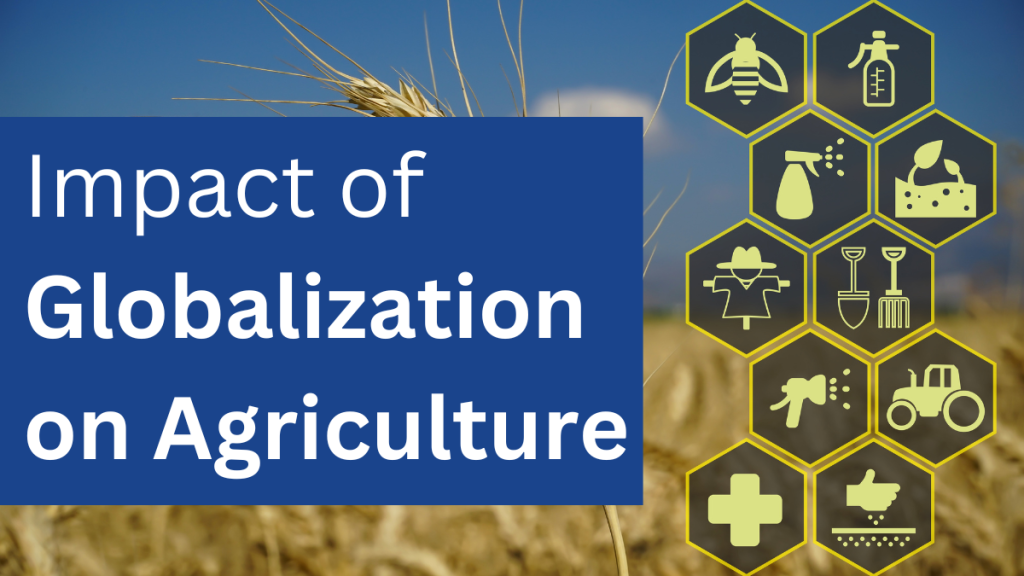Globalization has helped in creating waves in the field of agriculture. It has changed the way in which farmers produce and sell their products. Today’s world has become increasingly interconnected to each other. Due to this, agricultural practices have been influenced by global forces. Some of them have been positive while others have been negative implications. Through this blog, we will take you on a journey through the impact of globalization on agriculture. We will also be providing some examples to allow you to picture these effects.
- Increased Market Access
Globalization has been responsible for access to larger market resources for farmers. Thanks to the evolution of transportation and communication, you can export agricultural products to different parts of the world. Because of this change, farmers now have contact to international markets. This means they can reach a larger customer base and get better prices as well as profits for their produce.
An example can be given of a dairy farmer in the United States who exports cheese. With international market contact, he can export his products cheese producing countries like France or Japan. This increased market access has provided farmers with more opportunities for financial growth.

- Technological Advancements
There is now a rather dramatic change in farming practices thanks to advanced technology. The rapid evolution of technology has become a blessing for farmers because of the ease in knowledge sharing. Farmers have now been able to adopt new farming practices, better machines and improved skills because of this collaboration.
For example, the use of techniques like precision agriculture, which uses drones and GPS, allows farmers to adjust the use of fertilizers, water, and pesticides, resulting in better produce and even better reduced environmental impact. Besides this, genetically modified crops have helped farmers defeat pest problems, diseases, and bad weather conditions. This has led to better productivity and food security.
- Changing Dietary Preferences
Thanks to globalization, there has been a significant change or an influence in dietary preferences and food habits around the world. Today, people have become more connected to different cultures through travel and media. This means more people have begun sharing their food preferences and practices. This has helped to create new market opportunities for farmers. This has helped to cater to changing demands of agriculture and food practices.
One example can be given of avocados. They have recently become a superfood of sorts in Western Countries. This popularity has seen a rise in demand for this fruit in other parts of the world. Again, this has resulted in regions like Mexico and Kenya, traditional avocado producing countries to boost their production. Farmers who can adapt to these changing preferences are able to diversify their products. In addition to this, they can now find new markets which in turn results in increased income and economic stability.
- Increased Competition
Yes, its true that globalization offers new markets. This also means that there will be arise in competition in this sector. Farmers getting access to the same market has led to a healthy competition for customers between them. While on the one side, it’s a good thing, it can become problematic for small scale farmers. They would most likely lack the resources or marketing strategies to compete with larger farms.
And while this is a negative aspect, an increase in competition can bring about innovative practices which bring about much needed changes in the agricultural sector. Farmers will be able to increase their efficiency and bring forth sustainable farming practices to name just a few advantages of this. The ultimate result is that there will be access better-quality produce and improved farming techniques overall.
- Dependency on Imports
One of the negative impacts of globalization on agriculture is the increased dependency on imports. As global trade grows, countries often rely on imported agricultural products rather than producing them domestically. This dependency can have implications for food security, as countries become vulnerable to disruptions in global supply chains.
For example, a country that heavily relies on imported rice may face challenges during times of crisis, such as natural disasters or political conflicts, when the availability and affordability of imported rice are affected. This highlights the importance of maintaining a balance between domestic production and imports to ensure food security and stability.
- Environmental Concerns
Globalization has raised concerns about the environmental impact of agriculture. As global demand for food increases, farmers may resort to unsustainable practices, such as deforestation, excessive use of fertilizers, and overexploitation of water resources, to meet the demand. Such practices lead to environmental degradation, loss of biodiversity, and soil erosion. However, globalization can also promote sustainable agriculture by facilitating knowledge-sharing and the adoption of best practices from around the world.
For example, farmers in drought-prone areas can learn water-efficient irrigation techniques from farmers in arid regions, thus conserving water resources and mitigating the impact of climate change.
The Importance of Globalization on Agriculture
Let’s explore the importance of globalization on agriculture, highlighting the various advantages and challenges that come with a globalized agricultural system.
- Increased Trade and Economic Growth
Globalization has led to increased trade in agricultural products, resulting in substantial economic growth in many countries. Opening up markets to global trade allows farmers to access larger customer bases, which stimulates production and increases income opportunities. As a result, agriculture becomes a key driver of economic growth and development, especially in rural areas where farming is the main source of livelihood.
- Knowledge Sharing and Collaboration
Globalization encourages knowledge sharing and collaboration among farmers, researchers, and experts from different parts of the world. Farming investors can use conferences and online as well as offline forums to share their ideas and pick each other’s brains for their common goal. This exchange of ideas will surely increase productivity. It will also lead to newer solutions to age old problems because of the involvement of more people. These problems include climate change, pest control and so on.
- Access to Financing and Investments
Globalization will bring about more chances of investments and financial stakeholding in agriculture. This is especially true for developing countries. You see, when international financial institutions, private investors, and global agribusinesses feel like they need to invest in projects, it a huge boost to the farmers. These kinds of investments will bring about infrastructure changes, better research and most importantly, changes in archaic farming practices. Of course, all this simply leads to farmers’ stress load being reduced a little.
- Diverse Food Choices and Nutritional Benefits
Globalization has brought about better food choices for customers. It has provided better access to a wide variety of agricultural products all year round. Through imports and exports, consumers can enjoy plenty of different food choices. This includes access to exotic fruits and vegetables that are not grown domestically. This food diversity can help bring about a more balanced and the best thing is, it can lead to access to more food in regions where this is a problem.
- Sustainable Development and Environmental Conservation
Globalization has forced the agricultural sector to address the problems of sustainability and environmental conservation concerns. Thanks to more increase in awareness and international regulations, farmers have begun using more eco-friendly practices. They have begun to reduce chemical inputs and they have also implemented responsible land management methods. This global collaboration in research and shared sustainable agricultural methods has been a blessing. That’s because it has helped change farming practices and has helped reduce the negative environmental impacts and ultimately helped to preserve natural resources for future generations.
Challenges of Globalization on Agriculture
While globalization has brought about numerous benefits to the agricultural sector, it has also presented challenges that need to be talked about. An important challenge that has come about is that there is a risk of a volatile market and more price shifts due to global factors such as trade wars, currency fluctuations, and supply chain disruptions. Moreover, farmers may also face increased competition from foreign producers. This could lead to lower prices and profit margins. Additionally, there is a concern about the loss of traditional farming practices and local food cultures in the face of global communication in farming practices.
Conclusion
Globalization has left a lasting impact on the farming sector. While it is true that it has brought increased market access and technological advancements. There has been a negative impact like competition, dependency on imports, and environmental concerns. Policymakers, farmers, and consumers must work together to ensure that the benefits of globalization are higher than its negativity. By supporting sustainable practices, protecting local farmers, and promoting food security, we can secure the potential of globalization to create a more resilient and prosperous agricultural sector for the future.














